Features
Chicago Bassist, Jauqo III-X Releases a New Recording
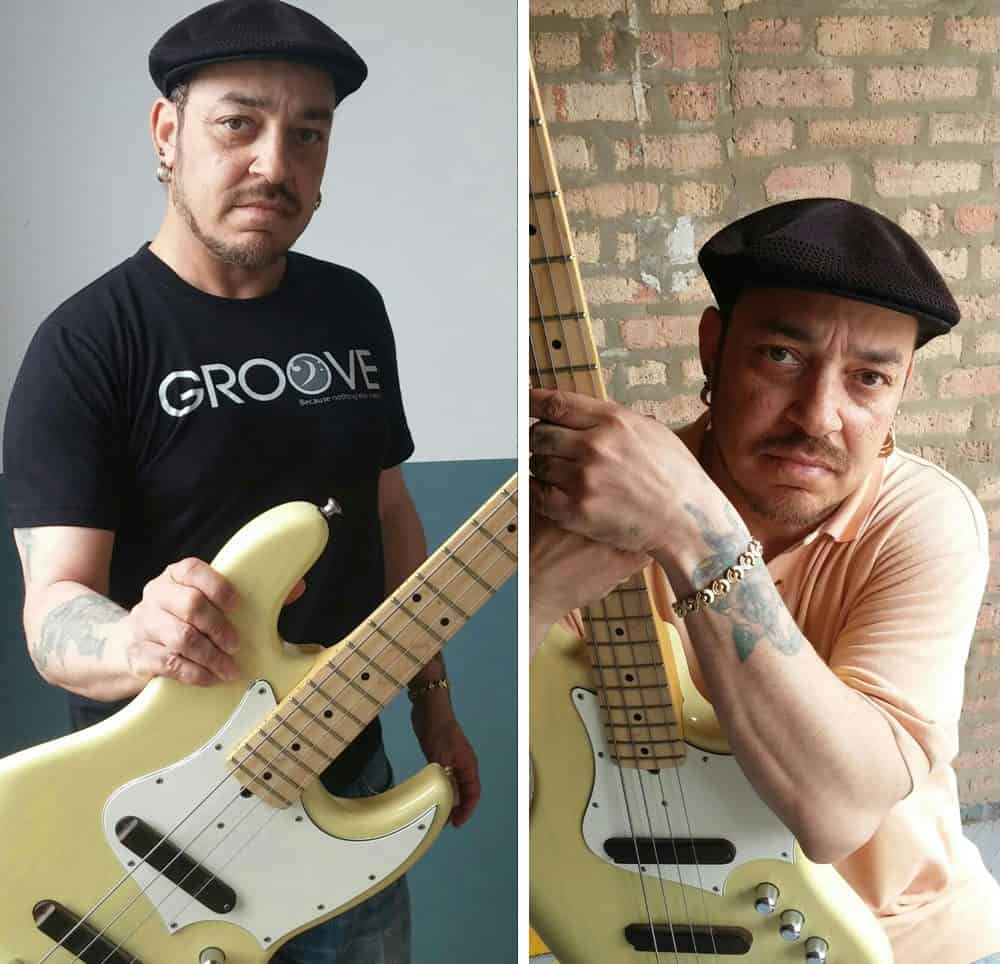
Chicago Bassist, Jauqo III-X Releases a New Recording…
Well renowned Chicago bassist, Jauqo III-X, recently released a new CD. This recording project was a bold exploration that took the concept of improvisation much further than most projects. Being based in Chicago, I was fortunate enough to be invited to attend this project’s marathon recording session. I attended this session not just for the “hang”, which was epic, but to see and hear first-hand this unusual trio and it’s unusual recording approach. The other unusual thing about this session was that those of us who attended the session got to watch a legendary session musician ply his trade in his natural environment.
Bass Musician Magazine (BMM): Thank you so much for taking the time to talk to me and our readers about your latest CD. I’ve been looking forward to this interview primarily because I was at the recording session for this CD, along with a few great Chicago bassists, which included Will Howard, Kemet Pryor and Barnum & Bailey Circus bassist Mike Brown. I was especially intrigued by your recording approach. Before we get into that, can you share with us what the title of you new CD is, and list the players that recorded with you?
Jauqo III-X (Jauqo): Thank you Vuyani, and I thank you for this opportunity. The name of the CD is Trioplicity and it features legendary drummer Bernard Purdie and talented guitarist Kudzai Kasambira.
BMM: You are welcome Jauqo. It was incredible, for those of us who were at the session, to watch your session with the legendary Bernard Purdie on drums. Not many get a chance to see a legend like Bernard in a recording session. Can you tell us how you came up with the idea of putting together this line up?
Jauqo: I have been listening to Bernard pretty much my entire life but, like a lot of young musicians just starting out, I didn’t know who I was listening to. His playing moved me in such a way that I just had to find out who this gem of musician was, so I would do some searching around until I was able to get my hands on some album credits and in Bernard’s case I wanted to hear every thing that he played on.
The original guitarist that was going to play on the album with me and Bernard was the phenomenally individualistic Pete Cosey. Unfortunately, a couple of days before the session Pete became ill and had to catch up on his rest. Guitarist Kudzai Kasambira, who I had worked with before, was willing and definitely able to step up to the plate, so I reached out to him and from there we were set. The main reason that I wanted Bernard on this project was because his pocket is one of the greatest in modern music. He and I have always had a great history, having played together a few times before the recording made doing this with him that much more powerful. As a kid, it was listening to Bernard that taught me what the pocket was and the importance of the marriage between the bassist and drummer. This includes the importance of having the proper space between the bass and drums, no matter what the musical style or genre may be.
Kudzai had worked with me before in the past on improvised and non-improvised projects (he’s one of the guitarist on my recording “The Low C# Theory“). For me my main focus was to toss any pre-conceived musical thoughts out the window and allow the music to create it’s own direction and speak through a collective and trusted voice of three individuals coming together as one solid vessel. I trusted Bernard and Kudzai to bring it and I appreciate them for doing just that and then some! All the music on Trioplicity is 110 % improvised and I am so proud of the interplay between me and Bernard as a rhythm section supporting each other and especially supporting and respectfully allowing Zudzai to speak any way that he and his instrument chose.
BMM: If I remember correctly, there were no charts, pre-written songs or rehearsals for this session. At the time, it seemed to me like you were all walking a suspended tight rope with no safety net beneath you. This was the most extreme and fearless improvisation I’d ever witnessed. Can you talk about this recording method and what you wanted to accomplish?
Jauqo: No charts at all, and there was no need. I let Bernard and Kudzai know that we were going to go in and what ever happens, happens – just let the tape roll. I definitely accomplished what I wanted and that was catching the three of us making the music manifest exactly as is was being channeled through us. I think some of the better and more true improvisational music comes from the musician applying his or her heart and soul, allowing the instrument to be the heartfelt tool through which their inner being’s deepest interpretation of what is transpiring during the moment is documented. I also was able to capture that very thin high wire balancing act between me and Bernard as a rhythm section and no matter how much freedom the three of us had, it still came down to the fact that the music speaks as a life line focused on saying something to those who make take the time to give it a listen.
I used my Adler fretless Sub Contra bass (C# F# B E), a bass that has the ability to go low, very low and very focused. At the same time, because it can go very low, if not dealt with accordingly, in the wrong hands it can be very one dimensional, but to properly capture such low frequencies even more, it has to be broken up into sections of three, highs, mids and lows,and that’s just the basics to get a proper mix if it’s a proper mix that you’re going for.
During the recording process I went direct into the board, I also went direct from the pre amp (I used a separate pre and power amp instead of a single head) and I mic’ed the cab. I used at least a total of 15 tracks individually, and that was so that when it was time to mix the bass, and correctly mix it with the drums and guitar, I had all the frequencies I needed for a clear and even recording and end result mix. I used no compression at all during the recording process but a little was used during the mix and mastering. During the mixing session, because I had used so many tracks to capture the full spectrum of the bass, I was able to borrow what I needed from the chain of three’s (High’s, Mid’s and Low’s). I mixed the bass to a great point way before I started to bring in the drums and guitar, the mixing process really was that the bass was the foundation, literally. The mastering process was a workout as well, most mastering facilities take a cookie cutter approach and the first thing they usually do is go in dismantling the bass, but the talented Harry Brotman worked with me during the mastering sessions and it went with out a hitch. That was because Harry allowed me to be me, and he agreed with me in knowing that to take away the bass would take away it’s warmth and growl and also block the presence of the properly placed high’s, mid’s and low’s from my playing that is so evident throughout the recording.
BMM: Wow! Fifteen tracks for the bass alone? That’s a lot of tracks! I’m sure that gave you an incredible amount of flexibility when it was time to mix. Again, I’m still amazed by the fact that the three of you went into the session without any charts or some type of framework to play within. Did you record the entire CD in one marathon session? I seem to only remember attending one session.
Jauqo: Haha!, yes that many tracks and the flexibility was definitely needed and I knew that going in. If not for all the tracks, the bass and the overall recording would not be what it is to a great degree. Depending on what kind of sound the bass player is going for, very low bass could be hard to capture, it’s like going after a wild Anaconda but once you capture it, do you want to keep it as is or attempt to tame it in order for you and it to work together?
The whole thing about going in with out charts was something that I’ve always been into and the only frame work was to just capture what we collectively ended with and I’m very proud of the end results. And yes, the entire session was definitely a marathon that took place in one day.
BMM: In many ways, your excursion into extreme improvisation (my description, not yours) on this CD is no surprise to many of us who know you. You are known by musicians all over the world for charting your own course musically. I have to acknowledge and thank you for pushing me into the role of a band leader.
You spent some time living with the late, great Ornette Coleman. Did he influence you to follow your own imagination in creating music, or have you always been musically unique and adventurous?
Jauqo: It could be considered extreme for how we went about it but for me it was just like a walk in the park (laughter). As far as charting my own course musically, I was under the impression from the moment that I first listened to music, in a mind that I could at the very least understand what I was listening to, and like a duck to water I knew that there was no other way for me to be other than be myself. The origins of music is to be an individual and do your best to express your self as such, to not do that is to neglect your self truth and some people wonder why they can’t seem to figure things out musically, maybe if they take the time, heart and courage to give themselves a chance they could be the musician or artist that they think they are.
And you’re very welcome and I’m proud that you are a band leader and I’m sure that it has been an uplifting experience for you in regards to gaining higher levels of musicality and self growth that you weren’t even aware you had in you. Being a band leader can teach one a lot about self.
Ornette was to me what Charlie Parker was to Miles Davis. I felt a kinship with Ornette and I had to meet him. Before I met Ornette I was already leading my own band and trying to figure out ideas and concepts. When I did finally meet Ornette, he acknowledged that I was on the correct track and moving in the right direction.
For the most part he got me and he recognized where I was coming from and that meant a lot to me. We would talk for many hours and a lot of that was about life, and our ideas and concepts and he was sharing many aspects of his Harmolodic concept. Ornette was beyond awesome and sincere and he meant a lot more to me than the musical indivisaul that he was. He simply reminded me that at the end of the day, my musical self is just an extension of where I’m at, where I come from, where I’ve been and where I’m going.
BMM: That was a beautiful tribute to Ornette Coleman. Thank you for sharing with us what he meant to you. Most of us think of him as a legendary giant of jazz, but you got to know him as more than a musician, as a friend. In my experience, I’ve found that music is what introduces us to each other as musicians. After a while, we end up appreciating the friendships far more than each other’s musicianship. That is what I love most about music. It has given me so many brothers and sisters all over the world that I otherwise would not have known.
You have had very long associations and endorsement relationships with many music equipment manufacturers over the years. Can you tell us about some of the companies whose products you endorse?
Jauqo: I’ve been using and endorsing Ashdown Engineering amps, as of early 2016 it will be 18 years. They really deliver and they are some of the most versatile amps on the market – that is one of the best things I like about them. I have never had an issue with an Ashdown amp or cab breaking down on me, always reliable and that is very important. Mark Gooday and all the other guys at Ashdown are really about doing the best that they can to put proper amps and cabs on the market and in different price ranges so as to not leave any one out who may be interested in having their own Ashdown experience.

BMM: Brace yourself Jauqo, I’m going to let out your secret…. I know you are an effects pedal junkie. Would you care to tell us about the effects you like or endorse? Is there a “holy grail” pedal that has somehow eluded you over the years that you would like to get?
Jauqo: Haha! I do like the pedals. I really, really like filters because they all sound so different. I definitely have my share of filters on my board…hahaha! I have pedal endorsements with Xotic, EWS (Engineering Work Store), Digitech, MXR, Pigtronix, Dunlop, Morely, Boss/Roland, Beigel Sound Lab (creator of the original Mu -Tron III ), SolidGold FX, Sub Decay, Daring Audio, Moog, Loud Button, Ashdown/Dr. Green, TC Electronic, Radial Engineering, Peterson Strobe Tuners, Henrietta Engineering, and Guyatone. As far as that holy grail pedal that may have eluded me over the years, thankfully it does not exist for me, at least it doesn’t at this point.
BMM: In your new release, Trioplicity, you used guitarist Kudzai Kasambira and legendary drummer Bernard Purdie. Since this is not your usual trio, can you tell us the name of your trio? Also, please talk a little bit about the players in your trio.
Jauqo: The name of my trio is The Jauqo III-X Reality. It consists of drummer Will McCraven and guitarist Micah Joseph Clark, two very talented musicians that I feel have something to say, while at the same time learning to allow the music to have the final say so. I can say without an ounce of ego that they have never been in a band situation where their individuality is nurtured and supported in the way it is with me. The Jauqo III-X Reality allows their input, while at the same time reminding them that they are students of the music.
BMM: As we close our conversation, do you have any words of advice for our readers? Specifically, can you share with us your advice or thoughts on things that would benefit our readers regarding their professionalism, business etiquette or musicianship?
Jauqo: Yes, I would say the following:
- If you have a hint that you want to be yourself, do it. Some people are going to like what you do and some aren’t. It’s the human way.
- Respect your own voice.
- Learn your worth.
- Be very open minded to music, there’s a treasure trove of awesome music longing to be discovered.
- Always be on time.
- When you are hired to play bass, do not attempt to be the MD or the producer. Just do what you are hired to.
- Respect the gig.
- Make sure your equipment is always in proper working condition.
- Always follow through – always do what you say you will do.
- Play for the song.
BMM: Thank you so much for taking the time to talk with me, and share aspects of your career with our readers. You have been very gracious and generous with your time.
Jauqo: Vuyani you are most welcome, and I would like to say thanks to Raul and Valery Amador for allowing me to share on this platform.
Jauqo III-X’s CD Trioplicity can be downloaded from CD Baby.
Jauqo III-X can be reached through the following portals:
- Jauqo’s Website: jauqoiii-x.com
- Jauqo’s Facebook Page: facebook.com/jauqojauqojauqo
- Jauqo’s Twitter Account: twitter.com/jauqoiiix
The CD can also be purchased here. jauqoiii-x.bandcamp.com/releases
YouTube Video
Features
Alberto Rigoni On Unexpected Lullabies
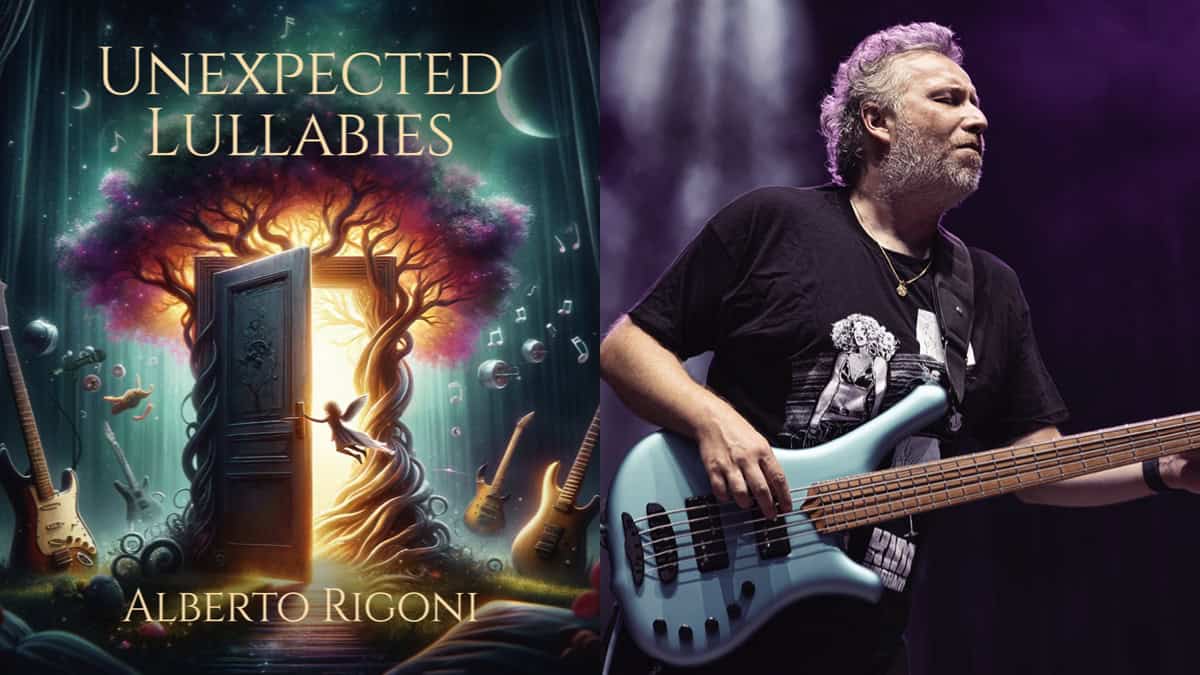
Readers have been fans of the composer, bass player, and Bass Musician contributor Alberto Rigoni for some time now.
In this interview, we had the opportunity to hear directly from Alberto about his love of music and a project near and dear to his heart, “Unexpected Lullabies”…
Could you tell our readers what makes your band different from other artists?
In 2005, I felt the urge to write original music. My first track was “Trying to Forget,” an instrumental piece with multiple bass layers (rhythm, solo, and arrangement), similar to the Twin Peaks soundtrack. When I played it for a few people, they really liked it, and I decided to continue composing based on my instinct and ear without adhering to any specific genre. In 2007, I released “Something Different” with Lion Music. The title says it all! Since then, I’ve released many solo albums, each different from the others, ranging from ambient to prog, fusion, jazz, and new age. I am very eclectic!
How did you get involved in this crazy world of music?
As a child, I listened to the music my parents enjoyed: my dad loved classical music, while my mom was into Pink Floyd, Genesis, Duran Duran, etc. These influences left a significant mark on my life. However, the turning point came at 15 when a drummer friend played me “A Change of Seasons” by Dream Theater, which was a shock! From that moment, I decided to play bass and cover Dream Theater songs, which I did for many years with my cover band, Ascra, until it disbanded in 2004. After that, I joined TwinSpirits (prog rock) led by multi-instrumentalist Daniele Liverani. Since then, I haven’t played any more covers!
Who are your musical inspirations, and what inspired the album and the songs?
My roots are in progressive rock metal, with influences from bands like Dream Theater, Symphony X, and many others. However, I listen to all genres and try to keep an open mind, which helps me compose original music. On bass, I was significantly inspired by Michael Manring and Randy Coven (bassist of Ark, Steve Vai, etc.). But I don’t have a real idol; I just follow my own path without compromise.
What are your interests outside of music?
Living in Italy, I love good food and wine! Beyond that, I have a deep interest in art in general and history, not just of my country. I enjoy spending time with friends, skiing, biking, and walking in nature. This is how I spend my free time. The rest of my time is devoted to music and my family!
Tell us about the new album.
It is definitely an out-of-the-box album. When I found out last year that I was going to have a baby girl, I decided to compose a sort of lullaby album, but I didn’t want to cover already famous lullabies. So, I started composing new tunes with the goal of creating an album that was half-sweet and half-hard rock. I did include some covers like “Strangers in the Night” by Frank Sinatra, sung by Goran Edman, former lead singer of Malmsteen. It’s not exactly a lullaby, but I felt the lyrics fit the album, as does the instrumental version of “Fly Me to The Moon.” There are also tracks with just bass and piano (Nenia) or two basses (Vicky). It was definitely an interesting creative process!
What is the difference between the new album and your previous releases, and will there be any new material from your other outfit called BAD AS?
BAD AS is essentially a metal band with several influences including prog. My solo genre is quite different, although there are some metal songs on a few albums. It’s always difficult for me to categorize my music… let’s say it’s a mix of prog, ambient, fusion, and new age.
Where was the album recorded, who produced it, and how long did the process take?
I produced my last album entirely by myself, including mixing and mastering. Unlike other albums I’ve produced within a few months, this one took much longer, perhaps because I was very busy or maybe because I wanted it to be perfect for my daughter, who is now three months old. In any case, I am satisfied. Once again, I did something different from my previous albums.
What is the highlight of the album for you and why?
My favorite song is the first track titled “Vittoria,” named after my daughter. It’s the intro to the record and isn’t very long, but the melody stuck in my head. Another standout track is the instrumental version of “Fly Me to The Moon” by Frank Sinatra, where I used fretless bass. The first part is sweet, the second part definitely rocks!
How are the live shows going, and what are you and the band hoping to achieve?
With BAD AS, this year we shared the stage with David Ellefson’s (former Megadeth bassist) band and talented young singer Dino Jelusik (White Snake). We plan to continue performing all over Europe!
What’s in store for the future?
I am working on an instrumental project called Nemesis Call, a progressive shred prog metal album with various influences. It will feature guest appearances from famous musicians like drummers Mike Terrana and Thomas Lang, as well as young talents like Japanese guitarist Keiji from Zero (19), 14-year-old Indian drummer Sajan Young, and guitarists Alexandra Zerner and Alexandra Lioness, Hellena Pandora. It’s scheduled for release at the end of the year or early 2025. As an independent artist, I have launched a fundraising campaign with exclusive pledges at www.albertorigoni.net/nemesiscall. And no, I am not begging; the album will be released anyway!
What formats is the release available in?
Unexpected Lullabies is available both as a Digipack CD and on streaming platforms.
What is the official album release date?
June 4th, 2024.
Thanks for this interview Bass Musician Magazine and for the continued support to my career!
Visit Online:
www.albertorigoni.net
www.youtube.com/albertorigoni
albertorigoni.bandcamp.com
www.instagram.com/albertorigonibassplayer
www.facebook.com/albertorigonimusic
www.tiktok.com/@albertorigonibassist
CD Track Listing:
1. Vittoria
2. Fly Me to the Moon
3. Azzurra
4. Dancing with Tears in My Eyes (feat. John Jeff Touch)
5. Out of Fear
6. Veni Laeatitia (feat. Alexandra Zerner)
7. Nenia
8. Slap Lullaby (feat. Karl Clews)
9. Saga
10. Vicky (feat. Michael Manring)
11. Ocean Travelers (feat. Vitalij Kuprij)
12. Strangers in the Night (feat. Göran Edman)
13. Peaceful
14. Un uomo che voga (feat. Eleonora Damiano)
Band Line-Up:
- Tommaso Ermolli arrangements on “Vittoria”
- Sefi Carmel on “Fly Me to the Moon” (Cover) (except for the keyboard solo by Alessandro Bertoni)
- Piano and keyboards by Alessandro Bertoni on “Azzurra”
- Leonardo Caverzan, guitars, and John Jeff Touch, vocals on “Dancing with Tears in my Eyes” (Cover)
- T. Ermolli keys on “Out of Fear”
- Alexandra Zerner everything on “Veni Laetitia”
- Daniele Bof piano on “Nenia”
- Karl Clews, piccolo bass on “Slap Lullaby”
- Jonas Erixon vocals and guitars on “Saga”
- Michael Manring bass on “Vicky”
- Vitalij Kuprij, keyboards and piano, and Josh Sapna, guitars, on “Ocean Traveler”
- Göran Edman, vocals, Emiliano Tessitore, guitars, Emiliano Bonini, drums, on “Strangers in the Night” (Cover) everything by Alberto Rigoni and vocals by Federica “Faith”
- Sciamanna on “Peaceful”
- T. Ermolli, guitars, and Eleonora Damiano, vocals, on “Un uomo che voga All drums programmed by Alberto Rigoni
Bass Books
Interview With Barker Bass’s Inventor and Writer Lee Barker
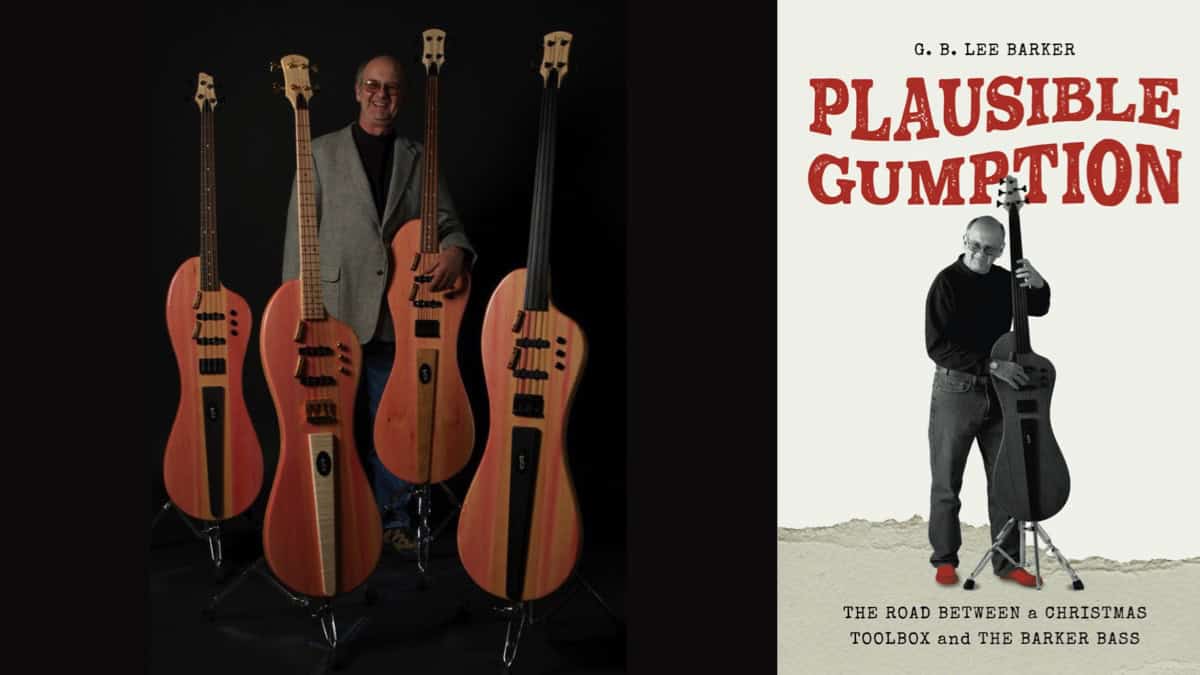
If you are an electric bass player, this is an exciting time to be alive as this relatively new instrument evolves around us. Some creative individuals have taken an active role in this evolution and made giant leaps in their own direction. Lee Barker is one of these inventive people having created the Barker Bass.
Fortunately, Lee is also an excellent writer (among so many talents) and has recently released his book “Plausible Gumption, The Road Between a Christmas Toolbox and The Barker Bass”. This book is a very fun read for everyone and shares a ton of details about Lee’s life in general, his experiences as a musician, a radio host, and a luthier. Now I am fortunate to have the great opportunity to gain even more insights into this renaissance man with this video interview.
Plausible Gumption, The Road Between a Christmas Toolbox and The Barker Bass is available online at Amazon.com
Features
Bergantino Welcomes Michael Byrnes to Their Family of Artists
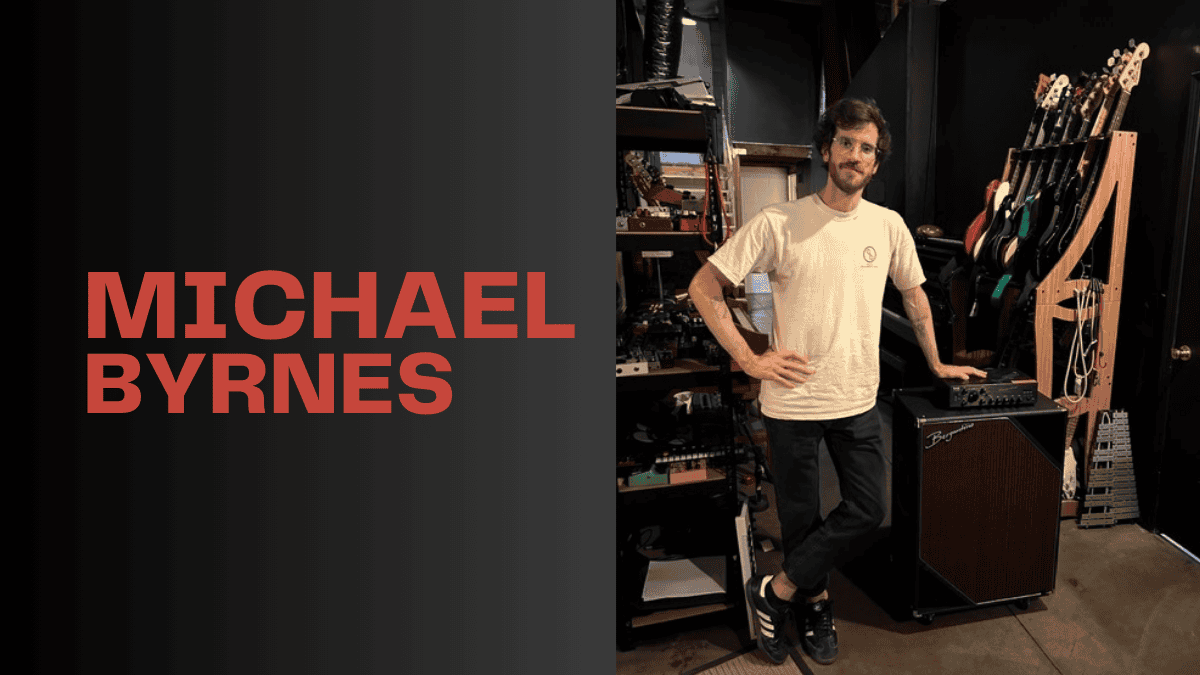
Interview and photo courtesy of Holly Bergantino of Bergantino Audio Systems
With an expansive live show and touring, Mt. Joy bassist Michael Byrnes shares his experiences with the joyful, high-energy band!
Michael Byrnes has kept quite a busy touring schedule for the past few years with his band, Mt. Joy. With a philosophy of trial and error, he’s developed quite the routines for touring, learning musical instruments, and finding the right sound. While on the road, we were fortunate to have him share his thoughts on his music, history, and path as a musician/composer.
Let’s start from the very beginning, like all good stories. What first drew
you to music as well as the bass?
My parents required my sister and I to play an instrument. I started on piano and really didn’t like it so when I wanted to quit my parents made me switch to another instrument and I chose drums. Then as I got older and started forming bands there were never any bass players. When I turned 17 I bought a bass and started getting lessons. I think with drums I loved music and I loved the idea of playing music but when I started playing bass I really got lost in it. I was completely hooked.
Can you tell us where you learned about music, singing, and composing?
A bit from teachers and school but honestly I learned the most from just going out and trying it. I still feel like most of the time I don’t know what I am doing but I do know that if I try things I will learn.
What other instruments do you play?
A bit of drums but that’s it. For composing I play a lot of things but I fake it till I make and what I can’t fake I will ask a friend!
I know you are also a composer for film and video. Can you share more
about this with us?
Pretty new to it at the moment. It is weirdly similar to the role of a bass player in the band. You are using music to emphasize and lift up the storyline. Which I feel I do with the bass in a band setting. Kind of putting my efforts into lifting the song and the other musicians on it.
Everybody loves talking about gear. How do you achieve your “fat” sound?
I just tinker till it’s fat lol. Right now solid-state amps have been helping me get there a little quicker than tube amps. That’s why I have been using the Bergantino Forté HP2 – Otherwise I have to say the cliche because it is true…. It’s in the hands.
Describe your playing style(s), tone, strengths and/or areas that you’d like
to explore on the bass.
I like to think of myself as a pretty catchy bass player. I need to ask my bandmates to confirm! But I think when improvising and writing bass parts I always am trying to sneak little earworms into the music. I want to explore 5-string more!
Who are your influences?
I can’t not mention James Jamerson. Where would any of us be if it wasn’t for him? A lesser-known bassist who had a huge effect on me is Ben Kenney. He is the second bassist in the band Incubus and his playing on the Crow Left the Murder album completely opened me up to the type of bass playing I aspire towards. When I first started playing I was really just listening to a lot of virtuosic bassists. I was loving that but I couldn’t see myself realistically playing like that. It wasn’t from a place of self-doubt I just deep down knew that wasn’t me. Ben has no problem shredding but I was struck by how much he would influence the song through smaller movements and reharmonizing underneath the band. His playing isn’t really in your face but from within the music, he could move mountains. That’s how I want to play.
What was the first bass you had? Do you still have it?
A MIM Fender Jazz and I do still have it. It’s in my studio as we speak. I rarely use it these days but I would never get rid of it.
(Every bass player’s favorite part of an interview and a read!) Tell us about
your favorite bass or basses. 🙂
I guess I would need to say that MIM Jazz bass even though I don’t play it much. I feel connected to that one. Otherwise, I have been playing lots of great amazing basses through the years. I have a Serek that I always have with me on the road (shout out Jake). Also have a 70’s Mustang that 8 times out of 10 times is what I use on recordings. Otherwise, I am always switching it up. I find that after a while the road I just cycle basses in and out. Even if I cycle out a P bass for another P bass.
What led you to Bergantino Audio Systems?
My friend and former roommate Edison is a monster bassist and he would gig with a cab of yours all the time years ago. Then when I was shopping for a solid state amp the Bergantino Forté HP2 kept popping up. Then I saw Justin Meldal Johnsen using it on tour with St. Vincent and I thought alright I’ll give it a try!
Can you share a little bit with us about your experience with the Bergantino
forte HP amplifier? I know you had this out on tour in 2023 and I am pretty
certain the forte HP has been to more countries than I have.
It has been great! I had been touring with a 70’s SVT which was great but from room to room, it was a little inconsistent. I really was picky with the type of power that we had on stage. After a while, I thought maybe it is time to just retire this to the studio. So I got that Forte because I had heard that it isn’t too far of a leap from a tube amp tone-wise. Plus I knew our crew would be much happier loading a small solid state amp over against the 60 lbs of SVT. It has sounded great and has really remained pretty much the same from night to night. Sometimes I catch myself hitting the bright switch depending on the room and occasionally I will use the drive on it.
You have recently added the new Berg NXT410-C speaker cabinet to your
arsenal. Thoughts so far?
It has sounded great in the studio. I haven’t gotten a chance to take it on the road with us but I am excited to put it through the paces!
You have been touring like a madman all over the world for the past few
years. Any touring advice for other musicians/bass players? And can I go to Dublin, Ireland with you all??
Exercise! That’s probably the number one thing I can say. Exercise is what keeps me sane on the road and helps me regulate the ups and downs of it. Please come to Dublin! I can put you on the guest list!
It’s a cool story on how the Mt. Joy band has grown so quickly! Tell us
more about Mt. Joy, how it started, where the name comes from, who the
members are and a little bit about this great group?
Our singer and guitarist knew each other in high school and have made music together off and on since. Once they both found themselves living in LA they decided to record a couple songs and put out a Craigslist ad looking for a bassist. At the time I had just moved to LA and was looking for anyone to play with. We linked up and we recorded what would become the first Mt. Joy songs in my house with my friend Caleb producing. Caleb has since produced our third album and is working on our fourth with us now. Once those songs came out we needed to form a full band to be able to do live shows. I knew our drummer from gigging around LA and a mutual friend of all of us recommended Jackie. From then on we’ve been on the road and in the studio. Even through Covid.
Describe the music style of Mt. Joy for me.
Folk Rock with Jam influences
What are your favorite songs to perform?
Always changing but right now it is ‘Let Loose’
What else do you love to do besides bass?
Exercise!
I always throw in a question about food. What is your favorite food?
I love a good chocolate croissant.
Follow Michael Byrnes:
Instagram: @mikeyblaster
Follow Mt. Joy Band:
Instagram: https://www.instagram.com/mtjoyband
Facebook: https://www.facebook.com/mtjoyband
Bass Videos
Artist Update With Mark Egan, Cross Currents
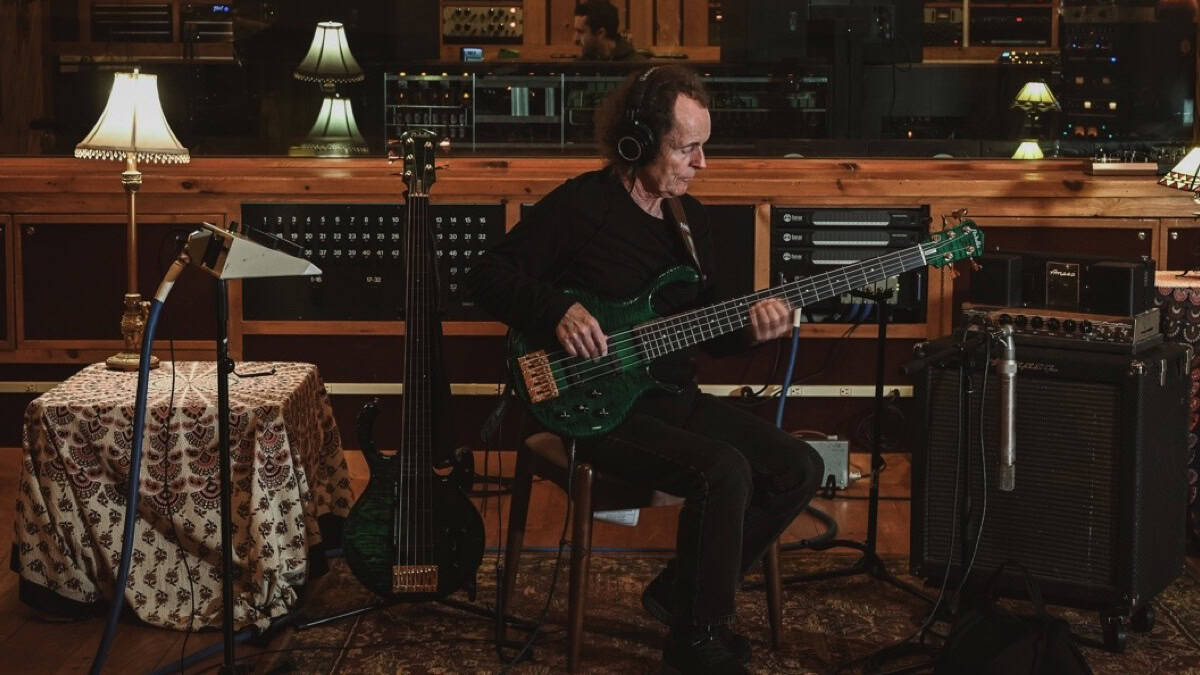
I am sure many of you are very familiar with Mark Egan as we have been following him and his music for many years now. The last time we chatted was in 2020.
Mark teamed up with drummer Shawn Pelton and guitarist Shane Theriot to produce a new album, “Cross Currents” released on March 8th, 2024. I have been listening to this album in its entirety and it is simply superb (See my review).
Now, I am excited to hear about this project from Mark himself and share this conversation with our bass community in Bass Musician Magazine.
Photo courtesy of Mark Egan
Visit Online:
markegan.com
markegan.bandcamp.com
Apple Music
Amazon Music
Bass Videos
Interview With By the Thousands Bassist Adam Sullivan
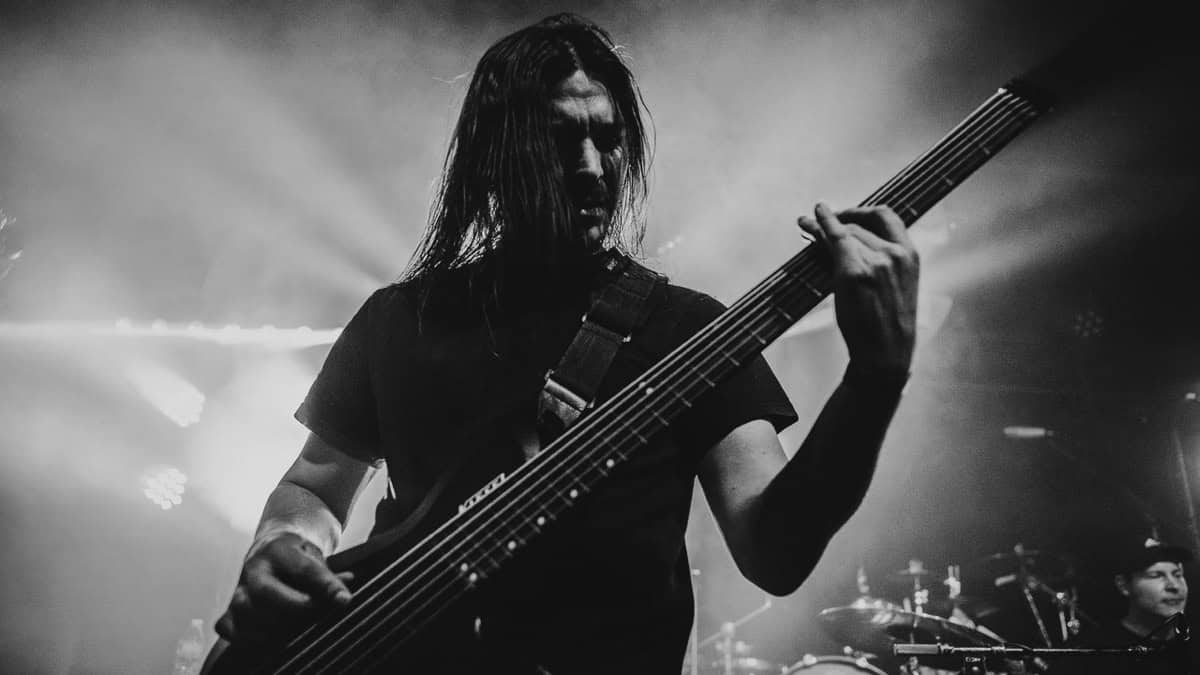
Bassist Adam Sullivan…
Hailing from Minnesota since 2012, By the Thousands has produced some serious Technical Metal/Deathcore music. Following their recent EP “The Decent”s release, I have the great opportunity to chat with bassist Adam Sullivan.
Join me as we hear about Adam’s musical Journey, his Influences, how he gets his sound, and the band’s plans for the future
Photo, Laura Baker
Featured Videos:
Follow On Social
IG &FB @bythethousands
YTB @BytheThousands











